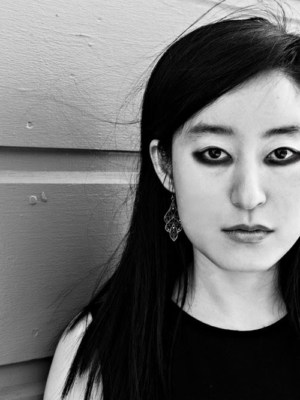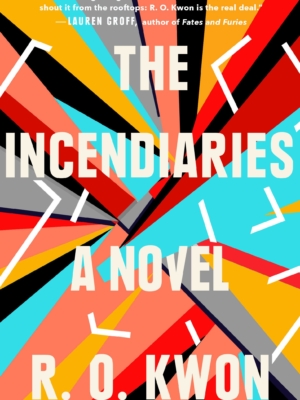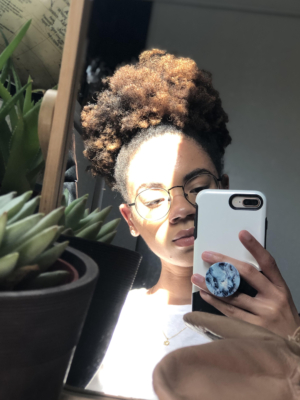R.O. Kwon, Author

Photo Credit: Smeeta Mahanti
MacDowell Fellow R.O. Kwon’s debut novel, The Incendiaries, begins with an explosion that slowly expands into a complex and winding tale about lost faith, obsessive desire, and absolute devotion. Now available in paperback, The Incendiaries tells three stories: Will, a college freshman struggling with the loss of his faith and his mother’s illness; Phoebe, a piano prodigy turned party girl then cult follower; and John Leal, the barefoot, enigmatic leader of Jejah. The Incendiaries has been translated into five languages and was named best book of the year by forty publications. It was a finalist for the National Book Critics Circle John Leonard Award for Best First Book, the Los Angeles Times First Book Prize, and the Northern California Independent Booksellers Association Fiction Prize; and the book was nominated for the Aspen Prize and the Carnegie Medal. Kwon’s other writings have appeared in Buzzfeed, The Paris Review, The New Yorker, and on NPR. Aside from being a MacDowell Fellow, Kwon is also a fellow of and has received awards from Yaddo, The National Endowment for the Arts, The Bread Loaf Writer’s Conference, and The Sewanee Writer’s Conference.
R.O. Kwon was one of the many talented special guests that appeared on campus during the summer, and I attended her lecture on revision. She told us that The Incendiaries took ten years to become the novel we see on shelves today. One of the most important things I took from Kwon’s lecture was to start as close to the end as possible, writing until what you wrote can be written in no other way; you know the work is done when you stop having questions about it. The Incendiaries starts at the end of everything, a group of people celebrating as a bomb goes off, a building collapses, and the death of a group of girls who happened to be in the wrong place at the wrong time.
I was lucky enough to get a copy of The Incendiaries days before our interview and was inspired by the amount of freedom and complexity that Kwon imbues in Will, John, and Phoebe. The Incendiaries was inspired by Kwon’s own loss of faith at the age of seventeen as shown by the amount of care and nuance she puts into each character’s disillusion and devotion to their faith, as well as the deep exploration into each character’s psyche regarding their love for their faith.
I conducted my interview over the phone in July 2019. It has been edited for clarity.
Alexis McCadney: I heard that you’re teaching at the University of San Francisco! That’s where I received my BA in literature. How’d you come to teach there?
R.O. Kwon: I haven’t taught there since last spring. This fall, I’m going to be a thesis advisor. This past year, I’ve been traveling so much that I couldn’t really teach a standard class. I’ve really enjoyed teaching there.
AM: How did you end up becoming a thesis advisor there?
RK: I was asked to teach there. As a thesis advisor, you formally sort of guide someone and help them with their thesis in grad school.
AM: Have you taught undergraduate classes there?
RK: I’ve taught an undergraduate class there a couple of times.
AM: You mentioned in your lecture and a couple of interviews that you kept rewriting the first twenty pages of The Incendiaries. Did those drafts have the same “stream of consciousness” style, or did the revision process encourage you to try a different style and voice?
“I hate feeling as though I’m the one jerking the character around. I don’t like it when you can feel the string being pulled. In my own writing, I want it to feel much more organic.”
RK: I don’t think I would call the way that the novel is written as “stream of consciousness.” I don’t really know how to answer that—what it showed me about my style.
AM: I feel like it can be a hard question to answer because it can be so hard to show how some characters think and how they’re moving. I thought it was really interesting to see how the whole book is mainly through Will’s point of view, but at the same time not, it’s pretty unique.
RK: Thank you.
AM: In the revision class you mentioned that Phoebe was originally the main speaker before Will. Did switching to Will change anything drastically?
RK: I kind of let things happen as they will, and it’s kind of like I’m trying to get out of the book’s way as much as possible.
AM: So you kind of see the book as this living thing and you’re a bystander watching it and recording what it’s doing?
RK: Yeah, that’s more how it feels to me. I’m trying to be more of a medium than a puppet master. I hate feeling as though I’m the one jerking the character around. I don’t like it when you can feel the string being pulled. In my own writing, I want it to feel much more organic. That’s why characters often surprise me; they turn out to be different people than I thought they were, and that feels as if how writing works for me at least.
AM: I can’t remember which interview it was, but you said that there was one particular scene that you had hesitations about writing, but as you thought about it, there was no other way that you could write the scene and not have it happen.
RK: When I started writing the book, none of what is described is what I thought would happen. It’s just very much how I write. I don’t try to dictate who my characters are.
AM: John Leal is set up to be the antagonist, but he isn’t the character who commits the worst acts of violence in the book. Who would you say is the true villain of the story?
RK: I don’t think I think in terms of an antagonist in a novel. I’m much more interested in them as human beings. I’m not interested in writing easy or obvious villains.
AM: How did you go with the decision to make most of the dialogue in The Incendiaries indirect? Was that something that naturally happened as you wrote?
RK: For me, it was more about… Well, I really wanted the book to have more of a flow than to feel interrupted, and there’s a thing about quotation marks that for me feels very much as though the text is shouting at me. They’re very noticeable. And I didn’t want that in this novel.
AM: A lot of the relationships shift and change—you have some characters with positive development and others that regress pretty badly. Was there any specific method you used to keep track of a character’s development and relationships?
RK: I think I mentioned it in my revision class. I don’t look at [writing] along those lines very much. It’s a relatively short book, so that made it more possible to keep track of people. There was no outside mechanism I used to do that.
“I don’t think I think in terms of an antagonist in a novel. I’m much more interested in them as human beings. I’m not interested in writing easy or obvious villains.”
AM: That’s pretty cool to find out. Sometimes as I write, I get so focused on planning that I forget that relationships develop when I allow them to develop. It’s difficult to plan them completely.
The narrative tackles the warped devotion that Phoebe has for John and his cult. But, there’s also this warped form of love and devotion that Will has for Phoebe that becomes worse as the narrative progresses. Was this planned or did this naturally develop as you wrote?
RK: I’d say with those two, in general, I don’t go into a book with plans. I let the characters tell me what they want and where they’re going, from them and from the book. I don’t really go in with very many intentions.
AM: There’s this part in the narrative where Will refuses to believe that Phoebe had a hand in the bombing of the clinic because he argues that she’s too “docile” to commit such an act. But the readers know that Phoebe is a party girl and pretty independent. Is Will believing that Phoebe’s innocent due to his love for her or because she’s Korean?
RK: I wouldn’t necessarily say the latter. What I know is in the book, and for me to explain more to what is behind a character’s motivations doesn’t feel natural to me. There’s this story I love about T. S. Elliot. Someone asked him, why, when he wrote, “Ash Wednesday,” I forget the exact line, but it’s something like, “Lady, three white leopards sat underneath a juniper-tree.” And someone asked him, “What did you mean by that?” He said, “I meant, three white leopards sat under a juniper-tree.” I don’t feel like I can give any more information than the book is already giving.
 AM: Something unique about The Incendiaries to me is that both of the characters who lost faith find themselves devastated or alone due to losing that faith. In most narratives, losing and becoming disillusioned with faith is seen as a form of freedom and a positive. Would you be willing to share your thoughts on this, especially since you lost your own faith at a young age?
AM: Something unique about The Incendiaries to me is that both of the characters who lost faith find themselves devastated or alone due to losing that faith. In most narratives, losing and becoming disillusioned with faith is seen as a form of freedom and a positive. Would you be willing to share your thoughts on this, especially since you lost your own faith at a young age?
RK: I’ve talked a lot, I think, in interviews [about] how painful it was for me to lose my faith and how that was the first impulse that led me toward this book.
AM: In The Incendiaries, even though we have the cult and it is, of course, presented as bad, you also show that when someone loves their faith and then loses it, it can be incredibly devastating. I feel it’s popular to depict losing your faith as freeing no matter how much love you have for it.
RK: I don’t know if I would argue that religion is inherently good or bad. I’m not really interested in that question in fiction. I’m more interested in how it affects the characters, who are experiencing religion or not.
AM: In The Rumpus, you stated that your mentor, Michael Cunningham, told you that “You must love characters as God, but not more.” Do you think this gave you the freedom to write characters as messy and imperfect, or even as cruel, as you wanted to?
“What I know is in the book and for me to explain more to what is behind a character’s motivations doesn’t feel natural to me.”
RK: I love what he said, and I love that idea. I wouldn’t say that that allowed me to write in a way I wanted to write. I think that’s how I’d want to write, and I don’t think I’ve ever wanted to be a puppeteer when I’m writing fiction.
AM: Do you have something in mind that you’ve never been asked, but really wanted to answer?
RK: [laughs] I don’t really know. I’ll answer the question, “What am I reading right now?” What I’m reading is Kaveh Akbar’s Calling a Wolf a Wolf, which is a collection of poetry, and it’s really wonderful. I’ve heard him read twice and it was incredible. I would strongly encourage anyone who wants to hear him read to go do so.
AM: Is there anything you can share about your next project?
RK: I’ve been working for almost three years on my next novel, so that’s where I’m trying to put most of my energy to the extent that I can.
AM: Is there anything in the original draft of The Incendiaries that didn’t make it to the final draft that you may include in another project?
RK: I don’t think that’s how I think about writing fiction. It’s not that I come to it with ideas I want to stuff into the fiction. That wouldn’t be how I would think about the next book.
AM: All right, so I think that’s all the questions I had for you. Thank you for taking the time to speak with me!
Alexis McCadney is a nonfiction and fiction candidate at Antioch University Los Angeles. She received her BA in English literature from the University of San Francisco. She’s interned as a social media assistant for Litquake and worked as a nonfiction editor and fiction assistant editor for USF’s undergraduate staffed Ignatian Magazine. She has held many roles on Lunch Ticket, but is currently on the blog, outreach, graphic design, and research teams. Her hobbies include sketching, photography (does not like to be photographed herself), napping, and wasting her money.





